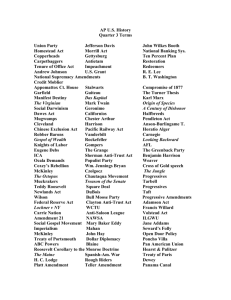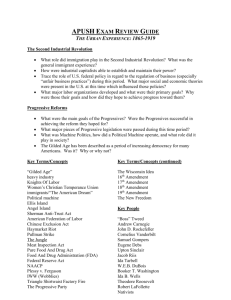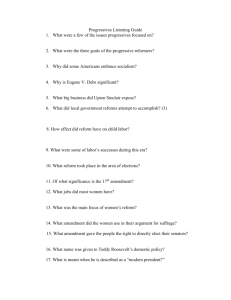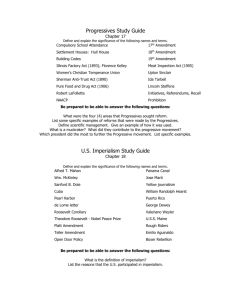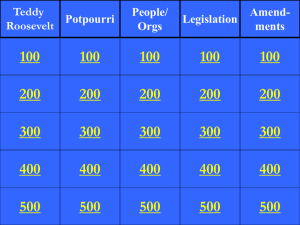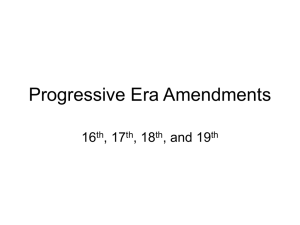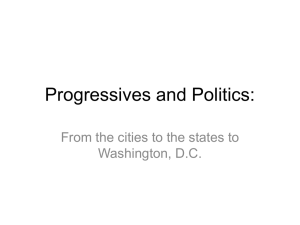Progressive Era Quiz: Reforms & Key Figures
advertisement
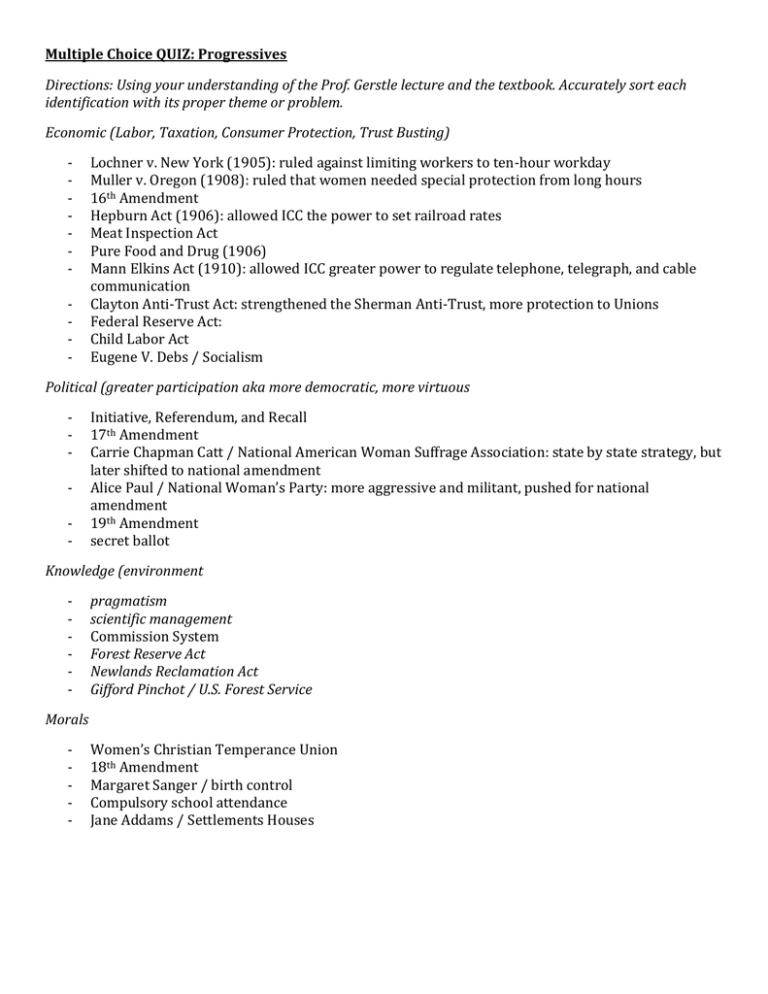
Multiple Choice QUIZ: Progressives Directions: Using your understanding of the Prof. Gerstle lecture and the textbook. Accurately sort each identification with its proper theme or problem. Economic (Labor, Taxation, Consumer Protection, Trust Busting) - Lochner v. New York (1905): ruled against limiting workers to ten-hour workday Muller v. Oregon (1908): ruled that women needed special protection from long hours 16th Amendment Hepburn Act (1906): allowed ICC the power to set railroad rates Meat Inspection Act Pure Food and Drug (1906) Mann Elkins Act (1910): allowed ICC greater power to regulate telephone, telegraph, and cable communication Clayton Anti-Trust Act: strengthened the Sherman Anti-Trust, more protection to Unions Federal Reserve Act: Child Labor Act Eugene V. Debs / Socialism Political (greater participation aka more democratic, more virtuous - Initiative, Referendum, and Recall 17th Amendment Carrie Chapman Catt / National American Woman Suffrage Association: state by state strategy, but later shifted to national amendment Alice Paul / National Woman’s Party: more aggressive and militant, pushed for national amendment 19th Amendment secret ballot Knowledge (environment - pragmatism scientific management Commission System Forest Reserve Act Newlands Reclamation Act Gifford Pinchot / U.S. Forest Service Morals - Women’s Christian Temperance Union 18th Amendment Margaret Sanger / birth control Compulsory school attendance Jane Addams / Settlements Houses Multiple Choice QUIZ: Progressives Directions: Using your understanding of the Prof. Gerstle lecture and the textbook, accurately label each identification with its proper theme or problem. Be prepared to defend your categorization. (E) Economic (P) Political (K) Knowledge (M) Morals 1. __________ 16th Amendment 15. __________ Hepburn Act (1906) 2. __________ 17th Amendment 16. __________ Initiative, Referendum, and Recall 3. __________ 18th Amendment 17. __________ Jane Addams / Settlements Houses 4. __________ 19th Amendment 18. __________ Lochner v. New York (1905) 5. __________ Alice Paul / National Woman’s Party 19. __________ Mann Elkins Act (1910) 6. __________ Carrie Chapman Catt / National 20. __________ Margaret Sanger / birth control American Woman Suffrage Association 21. __________ Meat Inspection Act 7. __________ Child Labor Act 22. __________ Muller v. Oregon (1908) 8. __________ Clayton Anti-Trust Act 23. __________ Newlands Reclamation Act 9. __________ Commission System 24. __________ pragmatism 10. __________ Compulsory school attendance 25. __________ Pure Food and Drug (1906) 11. __________ Eugene V. Debs / Socialism 26. __________ scientific management 12. __________ Federal Reserve Act 27. __________ secret ballot 13. __________ Forest Reserve Act 28. __________ Women’s Christian Temperance 14. __________ Gifford Pinchot / U.S. Forest Service Union Questions 1-3 refer to the excerpt below. “To be sure, much of progressivism was exclusionary. Yet we can now recognize not a singular political persuasion, but rarely a truly plural set of progressivisms, with workers, African Americans, women, and even Native Americans – along with a diverse and contentious set of middling folks – taking up the language and ideas of what was once conceived of as an almost entirely white, male, middle-class movement. As for the dreams of democracy from the period: despite the frequent blindness of those who embodied them, they remain bold, diverse, and daring. It is for this reason that democratic political theorists…have looked so longingly at the active citizenship of the Progressive Era, seeking to rekindle the democratic impulses of a century ago.” - Robert D. Johnston, historian, The Possibilities of Politics, 2011. 1. Which of the following interpretations of progressivism would most likely support this excerpt? a. Progressives were mostly conservatives in disguise b. Progressives were almost entirely white, middle-class and urban c. Progressives were educated modernizers interested in efficiency d. Progressives were a diverse group who supported various reforms 2. Which of the following would most directly support the argument that Progressives were “exclusionary”? a. Rural agrarian reformers played little role in the movement b. Women’s movements were sidelined by male-dominated governments c. Progressives did little to end the segregation of African Americans d. Most Progressives wanted to keep immigrants and laborers from voting 3. Which of the following Progressive reforms most directly promoted “active citizenship”? a. City manager laws b. Breaking up trusts c. The direct election of senators (17th Amendment) d. Regulatory commissions Questions 4-6 refer to the excerpt below. “Worst of any, however, were the fertilizer men, and those who served in the cooking rooms. These people could not be shown to the visitor – for the odor of a fertilizer man would scare any ordinary visitor at a hundred yards, an as for other men, who worked in tank rooms full of steam, their peculiar trouble was that they fell into the vats; and when they were fished out, there was never enough of them left to be worth exhibiting – sometimes they would be overlooked for days, till all but the bones of them has gone out to the world as Durham’s Pure Leaf Lard!” - Upton Sinclair, The Jungle, 1906. 4. The above excerpt is most closely associated with which sector of the Progressive movement? a. Muckrakers b. Trust-busters c. Wisconsin Idea d. Square Deal 5. The Jungle directly contributed to the passage of the a. National Labor Act b. Meat Inspection Act c. Eight-hour day d. Federal Trade Commission 6. Upton Sinclair’s The Jungle was primarily concerned about working conditions. Which of the following most helped organized labor? a. Mann Elkins Act b. The White House Conference c. Clayton Anti-Trust Act d. National Urban League Questions 7-8 refer to the excerpt below. “We believe that God created both man and woman in His own image, and, therefore, we believe in one standard of purity for both men and women, an in equal rights to all to hold opinions and to express the same with equal freedom. We believe in a living wage; an eight-hour day; in courts of conciliation and arbitration; in justice as opposed to greed of gain; in ‘peace on earth and goodwill to men. We therefore formulate and, for ourselves, adopt the following pledge, asking our sisters and brothers of a common danger and a common hope to make common causes with us in working its reason able and helpful precepts into the practice of everyday life: I hereby solemnly promise, God helping me, to abstain from all distilled, fermented, and malt liquors, including wine, beers, and cider, and to employ all proper means to discourage the use of and traffic in the same.” - National Woman’s Christian Temperance Union, Annual Leaflet, 1902 7. The above excerpt most directly reflects that the temperance movement a. Started out as an unpopular women’s fringe group b. Appeal to a varied constituency of reformers c. Drew strong support from immigrant groups d. Gained support by opposing the “liquor trust” 8. The Prohibition movement was similar to other Progressive reforms because it a. Began on the local and state levels before becoming national b. Started out under the leadership of Christian clergy c. Primarily was concerned about poor immigrant workers d. Aimed to reduce immorality destroying family life
